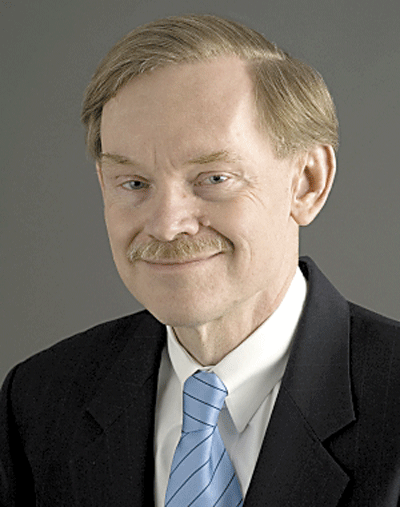UNITY — The president of the World Bank Group visited Unity College on Friday to talk about the bank’s work to improve economic conditions in developing countries, but was interrupted by some people in the audience opposed to the bank’s large structure and reach.
Robert Zoellick, the 11th president of the World Bank, spoke to about 100 community members and students in the Dorothy Webb Quimby Library. He explained that the bank formed in 1944 as a way to address the economic conditions that preceded World War II.
Today, the bank is the largest financier of health, education, infrastructure, environmental programs and anti-corruption measures in the developing world.
The bank is owned by 187 member governments and has 15,000 staff members from 168 countries. Zoellick said its goals are to open global markets, increase economic growth and help developing countries reduce poverty. The United States is the largest shareholder.
Zoellick stressed the bank’s environmental work to the audience at the small private college that emphasizes protecting natural resources. For instance, the bank has started an alliance aimed at advancing causes that protect the world’s oceans, called Global Partnership for Oceans.
One billion poor people rely on fish for protein, Zoellick said, but 85 percent of the world’s fisheries are depleted or overexploited. The number of dead zones in the world’s oceans, where life no longer exists, amount to the size of New Zealand.
What the World Bank and the oceans partnership can do is set objectives to restore fishery stocks and make designated areas of the ocean protected space, he said.
He said it’s important for people to recognize the economic benefit of protecting the environment, whether that benefit comes from a better tourism industry or protection of the land in times of some natural disasters.
Improving the rights of women is also necessary for improved economic conditions, he said.
“Gender equality is not only a fair and right thing to do, it’s good economics,” he said.
Zoellick’s talk and responses to questions were sometimes interrupted.
When he started talking about carbon taxes, audience member Noah Dillard, of Freedom, spoke out that he did not support the bank.
“Big banks are not sustainable,” he said. Because Zoellick held leadership positions at Goldman Sachs, Dillard added, “Goldman Sachs is responsible for the destruction of our communities here in Maine.
“I want to bail out these communities,” Dillard said.
A while later, another person yelled, “He works for corporate interests, not people.”
At one point, Zoellick said, “Debate is fine. I tend to like people who have facts.”
After the talk, Chelsea Ardle, a senior from Allentown, Pa., said the outbursts marred her experience and that many of those who interupted Zoellick were not students.
“Obviously the community was invited. In this situation they weren’t as cooperative as the students would have liked,” she said. “I came here to listen to what the World Bank is doing around the world.”
Owen Bastille, a freshman from Sutton, N.H., agreed, saying some were disrespectful.
“A lot of students wanted to know about it rather than debate about it,” he said.
Another student, Bri Rudinsky, a senior from York, Pa., said she came into the talk viewing the World Bank as more of a corporation, not as an entity doing good work.
Joseph Galli, interim vice president for college development, said he appreciated Zoellick’s responses.
“He engaged with those who voiced concerns in an open, respectful way that invited constructive dialogue,” he said.
The bank’s work is connected to Maine by the global market. In 2011, Maine’s exports to developing countries totaled about $1.5 billion, which is more than 40 percent of Maine’s total exports.
“The bank is working in those countries to promote open markets and economic growth, which creates more opportunities for Maine’s exporters,” World Bank spokesman David Theis wrote in an email.
By fostering a competitive business environment, fighting corruption and promoting transparency, the bank is helping to open export avenues not just in Maine but around the world, he said.
Theis said the bank also has a variety of partners in the U.S., including in Maine. The bank recently invited John Wise, director of the Maine Center for Toxicology and Environmental Health at the University of Southern Maine, to participate in the bank’s Global Partnership for Oceans.
At the end of the talk, college President Stephen Mulkey announced an international sustainability scholarship. He also presented Zoellick with a print by local artist Susan Cooney.
Zoellick’s talk was arranged through his brother, William Zoellick, chairman of Unity College’s board of trustees.
Erin Rhoda — 612-2368
erhoda@centralmaine.com
Send questions/comments to the editors.



Success. Please wait for the page to reload. If the page does not reload within 5 seconds, please refresh the page.
Enter your email and password to access comments.
Hi, to comment on stories you must . This profile is in addition to your subscription and website login.
Already have a commenting profile? .
Invalid username/password.
Please check your email to confirm and complete your registration.
Only subscribers are eligible to post comments. Please subscribe or login first for digital access. Here’s why.
Use the form below to reset your password. When you've submitted your account email, we will send an email with a reset code.